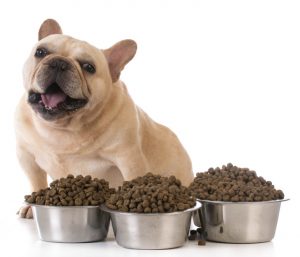
Organic Dog Food Worth The Money?
What can you expect in terms of nutrition and ingredients when you purchase organic dog food? And, most importantly,
are organic dog foods worth the higher price? Those are some of the questions I will explore in this article.
On this page you will find information on Names That Mean Death
Table of Content
What Is Natural Organic Dog Food?
Certified Organic Standards
Are Certified Natural Organic Dog Foods More Nutritious?
Certified Organic Dog Foods
Should You Buy a Natural Organic Dog Food?
What Is Natural Organic Dog Food?
Let’s take these terms one at a time. The AAFCO (Association of American Feed Control Officials) defines “natural” as follows:
A feed or ingredient derived solely from plant, animal or mined sources, either in its unprocessed state or having been subject to physical processing, heat processing, rendering, purification, extraction, hydrolysis,
The AAFCO Guidelines for Natural Claims go on to state that a dog food may only be labeled “natural” if “all of the ingredients and components of ingredients meet the definition above” .
Further AAFCO state: “the use of the term ‘natural’ is false and misleading if any chemically synthesized ingredients are present in the product.” Of course virtually all
“complete and balanced” dog foods contain chemically synthesized vitamins and minerals.
So AAFCO guidelines allow dog foods to be labeled “natural” as long as “a disclaimer is used to inform the consumer that the vitamins, minerals or other trace minerals are not natural.”
To meet this requirement, a disclaimer such as “Natural with added vitamins, minerals, and other trace nutrients” should be juxtaposed with the term “natural” on product labeling.
In other words, natural dog foods do not contain chemically synthesized ingredients such as artificial colors, flavors, preservatives,
or other artificial additives with the exception of vitamin and mineral supplements.
And since artificial ingredients are allowed “in amounts as might occur unavoidable in good manufacturing practices,
” trace amounts of artificial preservatives or other additives may well be present.
Okay, but what about the “organic” in natural organic dog food?
While all organic ingredients are natural, most natural ingredients aren’t organic. At least not by the official USDA definition of the word. This is where things get tricky.
Currently there is no organic certification program for pet foods in the US, so organic dog food is required to be certified under the human food regulations.
Human foods labeled as “organic” are strictly regulated and must comply with the production and handling requirements of the USDA’s National Organic Program (NOP).
More on that in a minute.
Some dog food manufacturers have had their foods certified as organic by the official, USDA-accredited certifying agencies,
and these organic dog foods meet the same high standards as any organic human food.
However, there are also dog foods and treats including the word organic in the product name (and occasionally even the company name) although none or only a few of their ingredients are actually organic.
This is a violation of USDA rules, but because the USDA has no authority to regulate pet food names and product claims
(and the agencies that do have the authority haven’t bothered to define the term “organic” for pet foods), they get away with it as long as they don’t claim to be “certified organic.”
In order to make sure that the natural organic dog food you’re considering is really organic, look for the green and white or black and white USDA Organic seal
(for foods containing at least 95% organic ingredients) and the name of the organic certifying agency (e.g., Oregon Tilth, OIA, QAI, OCIA, CCOF) on the package.
Back to Table of Content
Certified Organic Standards
According to the USDA National Organic Program (NOP), certified organic ingredients must be grown without synthetic pesticides and fertilizers,
sewer sludge, genetic engineering, irradiation, or artificial additives.
Organic meats used in natural organic dog food, must come from animals with access to the outdoors, raised on organic feed, and not treated with antibiotics or growth hormones.
Organic claims are independently verified by USDA-accredited organic certifying agencies with periodic on-site inspections,
audits of the production process, and examination of the detailed paper trail that must exist for each and every ingredient.
The labeling requirements for USDA certified organic foods are based on the percentage of organic ingredients in the food:
100% Certified Organic Ingredients – Foods containing 100% organic ingredients can be labeled “100% Organic” and display the USDA Certified
Organic seal on the front of the package. Organic ingredients must be identified as such in the ingredient list,
and the name of the certifying agency must be displayed on the information panel. Because complete and balanced dog foods contain synthetic vitamin and mineral supplements that
obviously aren’t organic, you won’t find any complete dog foods with the “100% Organic” label. There are, however, dog treats with this designation.
95% to 99% Certified Organic Ingredients – Foods containing 95-99% organic ingredients can be labeled “Organic” and display the USDA Certified Organic seal on the front of the package.
Organic ingredients must be identified as such in the ingredient list, and the name of the certifying agency must be displayed on the information panel.
The 1-5% non-organic ingredients must consist of NOP-approved nonagricultural substances or agricultural products not available in organic form.
and the name of the certifying agency must be displayed on the information panel. Foods labeled
“Made with Organic Ingredients” cannot be produced using excluded methods, sewage sludge, or irradiation.
Most “organic” kibbles fall into this category because they contain non-organic chicken,
lamb, and/or salmon meal in addition to organic fresh chicken meat and organic grains, vegetables, seeds, and oils.
Less than 70% Certified Organic Ingredients –
Foods containing 1-69% organic ingredients can identify these ingredients as organic on the information panel,
but they may not use the word “organic” anywhere on the front of the package.
Back to Table of Content
Are Certified Natural Organic Dog Foods More Nutritious?
No studies have been done regarding naural organic dog food, only organic human foods.
Some studies, such as the 5-year Quality Low Input Food (QLIF) study commissioned by the EU in 2004, have found that
certified organic crops and livestock products are more nutritious than conventionally produced foods.
Other studies have found no significant differences.
Where differences were found, vegetables and fruits had higher concentrations of phytonutrients and antioxidants,
while meats, eggs, and dairy products proved higher in omega-3 fatty acids and conjugated linoleic acid (CLA).
On the other hand, after commissioning a 12-month review of existing research, the UK’s Food Standards Agency concluded that
“there is no good evidence that consumption of organic food is beneficial to health in relation to nutrient content.”
At this point, the question of whether organic foods are more nutritious remains controversial.
Read More: Names That Mean Death



